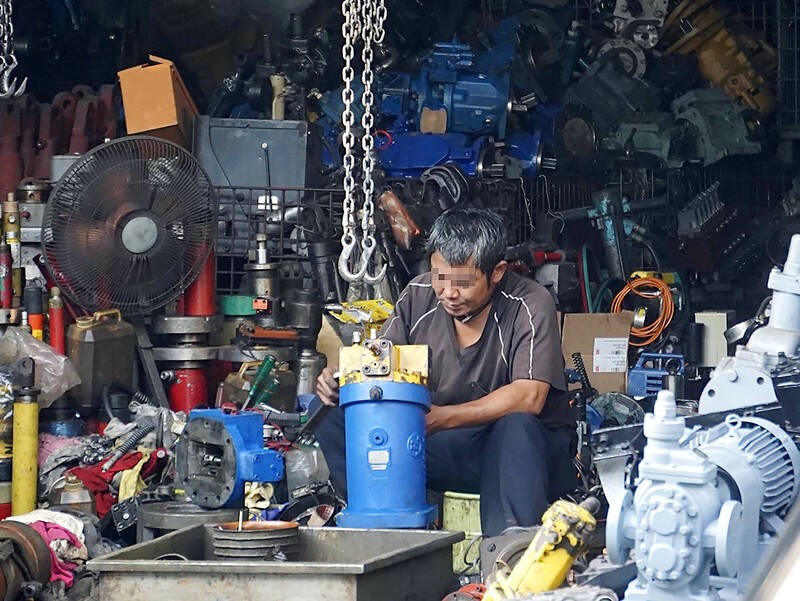The industrial production index last month grew 3.68 percent year-on-year to a record high of 141.57, driven by growth in computer, electronic component and automotive component production, the Ministry of Economic Affairs said yesterday.
Last month was the 31st consecutive month of annual expansion, with 3.68 percent being the biggest jump in the past three months, the ministry said.
The increase came on the back of an annual gain of 3.87 percent in the manufacturing production index, which makes up 93 percent of the industrial production index, to 143.49, the best August performance ever, the ministry said.

Photo: CNA
The rise in manufacturing production surpassed the ministry’s expectation that the index could fall 0.5 percent in the worst-case scenario or gain 2.4 percent in the best-case scenario, given weakness in the nation’s traditional industries.
“The better-than-expected growth in the manufacturing index was driven by strong performance in two sectors, electronic components and automotive components,” Department of Statistics Deputy Director-General Huang Wei-jie (黃偉傑) told a news conference in Taipei.
Local electronic component manufacturers likely received more orders last month, as Apple Inc prepared for the launch of the new iPhone 14 series this month, Huang said.
As a result, the electronic component production index expanded 14.45 percent annually to 190.26, supported by the integrated circuit sub-index, which advanced 31.5 percent year-on-year to a record high of 245.6.
However, the display sub-index plummeted 49 percent due to decreasing demand for end products, erasing growth in other electronic component segments, Huang said.
Meanwhile, the automotive component production index rose 9.37 percent from a year earlier, thanks to strong consumer demand for sports utility vehicles, and a rise in production of sedans and electric vehicles as key component shortages improved, the ministry said.
However, traditional industries reported lower production because of weak market demand, it said.
Production in the petrochemical sector shrank 25 percent annually, as clients remained conservative about placing orders amid an inventory digestion cycle, the ministry said.
Local manufacturers shut down some facilities for annual maintenance to cope with falling demand, it added.
Excessive inventories also caused a decline in production in the basic metals and machinery sectors, which plummeted 28 percent and 3 percent year-on-year respectively.
The ministry forecast that the manufacturing production index would retreat 1.8 percent annually this month at the worst, or grow 1.1 percent at the best, Huang said.
During the whole of the third quarter, the manufacturing index would grow 1.2 to 2.2 percent annually, the ministry said.

Among the rows of vibrators, rubber torsos and leather harnesses at a Chinese sex toys exhibition in Shanghai this weekend, the beginnings of an artificial intelligence (AI)-driven shift in the industry quietly pulsed. China manufactures about 70 percent of the world’s sex toys, most of it the “hardware” on display at the fair — whether that be technicolor tentacled dildos or hyper-realistic personalized silicone dolls. Yet smart toys have been rising in popularity for some time. Many major European and US brands already offer tech-enhanced products that can enable long-distance love, monitor well-being and even bring people one step closer to

TRANSFORMATION: Taiwan is now home to the largest Google hardware research and development center outside of the US, thanks to the nation’s economic policies President Tsai Ing-wen (蔡英文) yesterday attended an event marking the opening of Google’s second hardware research and development (R&D) office in Taiwan, which was held at New Taipei City’s Banciao District (板橋). This signals Taiwan’s transformation into the world’s largest Google hardware research and development center outside of the US, validating the nation’s economic policy in the past eight years, she said. The “five plus two” innovative industries policy, “six core strategic industries” initiative and infrastructure projects have grown the national industry and established resilient supply chains that withstood the COVID-19 pandemic, Tsai said. Taiwan has improved investment conditions of the domestic economy

Malaysia’s leader yesterday announced plans to build a massive semiconductor design park, aiming to boost the Southeast Asian nation’s role in the global chip industry. A prominent player in the semiconductor industry for decades, Malaysia accounts for an estimated 13 percent of global back-end manufacturing, according to German tech giant Bosch. Now it wants to go beyond production and emerge as a chip design powerhouse too, Malaysian Prime Minister Anwar Ibrahim said. “I am pleased to announce the largest IC (integrated circuit) Design Park in Southeast Asia, that will house world-class anchor tenants and collaborate with global companies such as Arm [Holdings PLC],”

MAJOR BENEFICIARY: The company benefits from TSMC’s advanced packaging scarcity, given robust demand for Nvidia AI chips, analysts said ASE Technology Holding Co (ASE, 日月光投控), the world’s biggest chip packaging and testing service provider, yesterday said it is raising its equipment capital expenditure budget by 10 percent this year to expand leading-edge and advanced packing and testing capacity amid strong artificial intelligence (AI) and high-performance computing chip demand. This is on top of the 40 to 50 percent annual increase in its capital spending budget to more than the US$1.7 billion to announced in February. About half of the equipment capital expenditure would be spent on leading-edge and advanced packaging and testing technology, the company said. ASE is considered by analysts